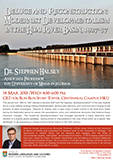
| News & Events |
| 14 March 2018 | |
SMLC Seminar Date: 14 Mar 2018 (Wed) |
|
The period from 1890 to 1937 marked a decisive shift from the “agrarian developmentalism” of the late imperial era to a new political ecology linking industrialization, technocratic planning, and novel sources of energy to the problem of state sovereignty. Stephen R. Halsey uses a case study of water control in the Huai River basin during the Nationalist period to assess the assumptions, aims, and institutional structures that fostered these important changes. The “modernist developmentalism” that emerged represents a highly distinctive local iteration of a shared global paradigm, casting doubt on interpretations that view China either as a typical “late developer” or as possessing a unique environmental history in the 20th century. Stephen Halsey serves as an Associate Professor of East Asian History at the University of Miami in Florida and completed his doctoral work at the University of Chicago. He specializes in modern China, but his research also engages with the fields of environmental studies, colonialism, and comparative history. In 2015 Halsey published his first book, Quest for Power: European Imperialism and the Making of Chinese Statecraft, with Harvard University Press. He is currently a Fulbright Senior Scholar affiliated with the Department of History at Nanjing University and is enjoying the opportunity to do nothing but read, think, and write for a year.
|
|
